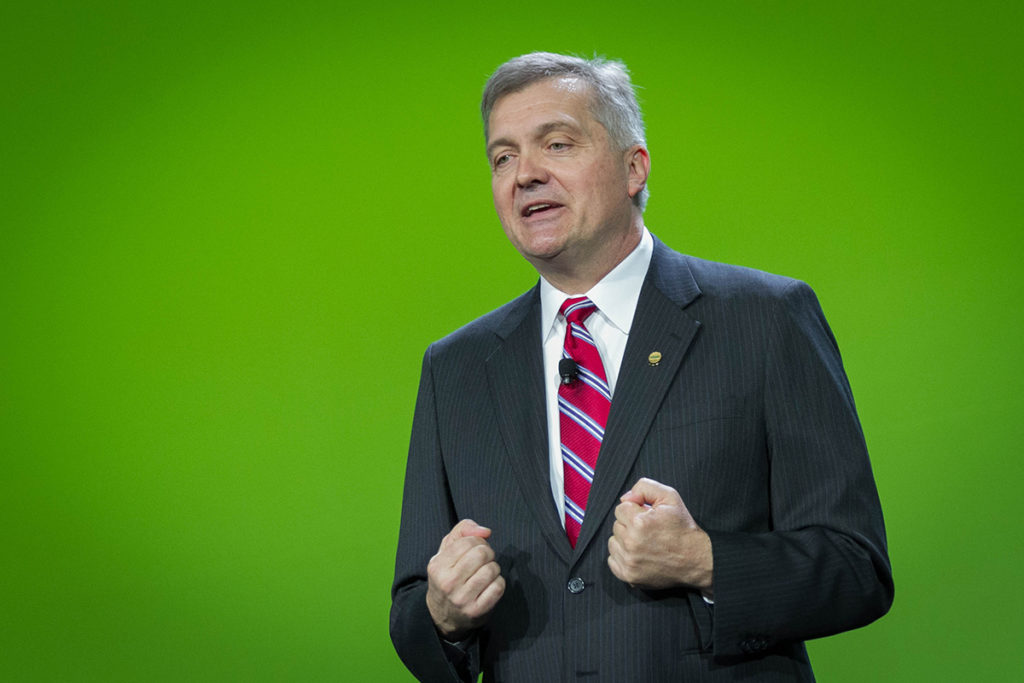
NASHVILLE, Tenn.—As new challenges confront electric cooperatives, NRECA CEO Jim Matheson told co-op leaders, “our ability to succeed today depends on strong engagement with member-owners.”
“With trust, the co-op adapts to new challenges in partnership with its members. Without trust, the co-op and its members drift apart,” Matheson told nearly 6,000 co-op CEOs, directors and other participants at the 76th NRECA Annual Meeting.
Matheson said engagement is based on mutual trust and noted that co-ops are trusted in many ways, from being community partners to being political advocates. “But, the future is going to test that trust,” Matheson cautioned. “You see it. You know it’s already being tested today.”
To help co-ops forge ahead in an era when energy management has fundamentally changed for co-op members, Matheson urged a focus on “the three votes each of your member-owners hold” that ultimately impact co-ops.
“To build engagement we have to understand these three votes, and use them,” said Matheson. “Each vote is a way for the member and the co-op to make decisions together, and to gain the benefit of doing so.”
Speaking Feb. 26 to the opening general session at Music City Center, Matheson said the first vote is “a critical part of co-op governance”: members’ voting control of the co-op.
“We place a premium on governance because it’s the basis of the relationship between the co-op and the community, our transparency, and the continuous conversation between members and the utility they own together,” said Matheson.
And in an era when few remember the lights first coming on, Matheson said that without accountability, “there’s no way to gain the trust of a new generation of folks who don’t even know they belong to a co-op, much less the advantages of trusted cooperation.”
The second vote “happens at the ballot box,” Matheson said, and he made clear to co-op leaders that “we don’t have a choice; we must be a force in politics.”
To that end, Matheson encouraged local participation in NRECA’s nonpartisan Co-ops Vote program, which he said has “everything you need to start a conversation.”
“Make sure our elected leaders know we expect them to represent all the people we serve,” said Matheson.
He also encouraged participation in the Action Committee for Rural Electrification (ACRE®), including the Co-op Owners for Political Action component, funded by member contributions. Noting that “elected officials and policymakers across the political spectrum trust us,” Matheson said “stronger political engagement creates stronger member engagement.”
While those first two votes have been around a long time, Matheson said one more vote has to be added today: economic choice.
“You may not think of it as voting, but it’s what happens every time your members buy an appliance or change their energy use,” he said. “Each new choice in energy management exposes us to competition from outside the industry.”
Matheson pointed to solar panels as “the first examples of what can happen when a new technology comes between the meter and the member,” and he warned of more to come.
“Every time a member installs a security system, or buys a smart refrigerator, or downloads a new app, someone is challenging our relationship with that member,” said Matheson, noting that those third parties don’t necessarily have consumers’ best interests at heart. Co-ops do, on the other hand, and need to be involved.
“When you help your member-owners understand their options, they will start making these choices in partnership with you,” he said.
All three votes “are going to happen with or without us,” Matheson told co-op leaders. “The outcomes matter.”
NRECA, he said, is committed to its partnership with its more than 900 member co-ops and to the wise use of these three votes in the communities it serves together.
“The relationship between NRECA and our members is vital to meeting these challenges,” Matheson said. “Our mission is to be trusted—to help your co-op be as involved and as engaged as possible. We are national leaders with local impact because you are local leaders with national impact.
“I believe our most prosperous future is realized when all electric co-ops—all of us—work together,” Matheson added. “Yes, we turned the lights on, but our brightest days are yet to come.”
Michael W. Kahn is a staff writer at NRECA.